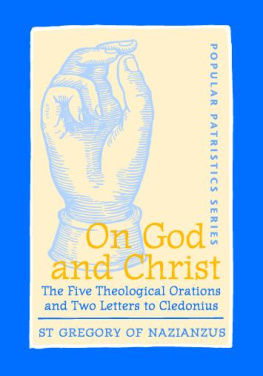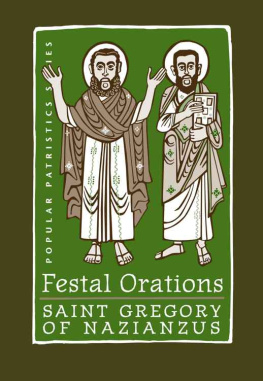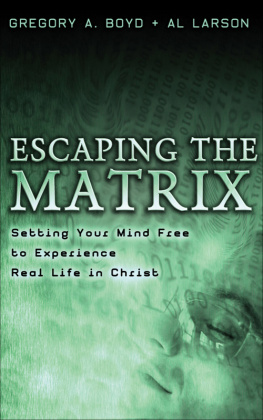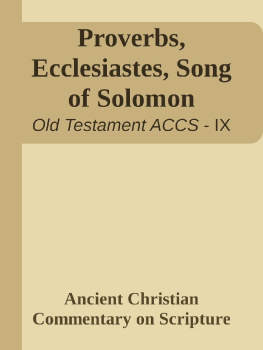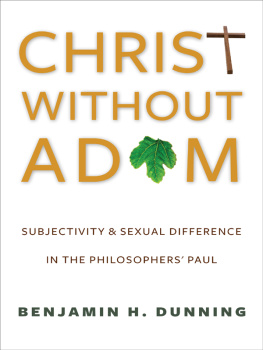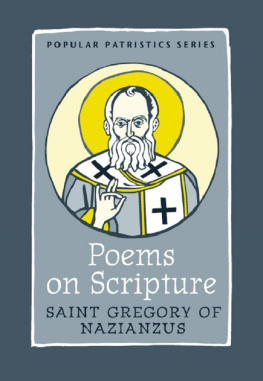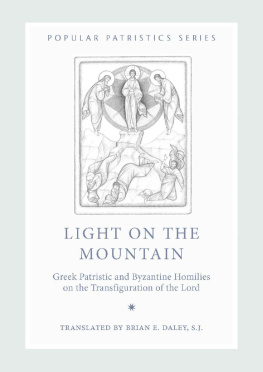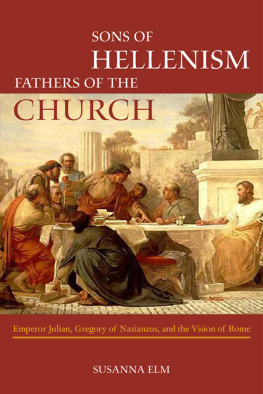St. Gregory of Nazianzus - On God and Christ: The Five Theological Orations and Two Letters to Cledonius (Popular Patristics Series)
Here you can read online St. Gregory of Nazianzus - On God and Christ: The Five Theological Orations and Two Letters to Cledonius (Popular Patristics Series) full text of the book (entire story) in english for free. Download pdf and epub, get meaning, cover and reviews about this ebook. year: 2011, publisher: St Vladimirs Seminary Press, genre: Religion. Description of the work, (preface) as well as reviews are available. Best literature library LitArk.com created for fans of good reading and offers a wide selection of genres:
Romance novel
Science fiction
Adventure
Detective
Science
History
Home and family
Prose
Art
Politics
Computer
Non-fiction
Religion
Business
Children
Humor
Choose a favorite category and find really read worthwhile books. Enjoy immersion in the world of imagination, feel the emotions of the characters or learn something new for yourself, make an fascinating discovery.
- Book:On God and Christ: The Five Theological Orations and Two Letters to Cledonius (Popular Patristics Series)
- Author:
- Publisher:St Vladimirs Seminary Press
- Genre:
- Year:2011
- Rating:3 / 5
- Favourites:Add to favourites
- Your mark:
- 60
- 1
- 2
- 3
- 4
- 5
On God and Christ: The Five Theological Orations and Two Letters to Cledonius (Popular Patristics Series): summary, description and annotation
We offer to read an annotation, description, summary or preface (depends on what the author of the book "On God and Christ: The Five Theological Orations and Two Letters to Cledonius (Popular Patristics Series)" wrote himself). If you haven't found the necessary information about the book — write in the comments, we will try to find it.
On God and Christ: The Five Theological Orations and Two Letters to Cledonius (Popular Patristics Series) — read online for free the complete book (whole text) full work
Below is the text of the book, divided by pages. System saving the place of the last page read, allows you to conveniently read the book "On God and Christ: The Five Theological Orations and Two Letters to Cledonius (Popular Patristics Series)" online for free, without having to search again every time where you left off. Put a bookmark, and you can go to the page where you finished reading at any time.
Font size:
Interval:
Bookmark:
ST GREGORY OF NAZIANZUS
O n G od and C hrist
T he F ive T heological O rations
and T wo L etters to C ledonius
The Five Theological Orations (Orations 2731) translated into English by Frederick Williams (Oration 27) and Lionel Wickham (Orations 2831) with Introduction and Notes by Lionel Wickham
The Two Letters to Cledonius (Letters 101 and 102) translated into English by Lionel Wickham with Introduction and Notes by Lionel Wickham
ST VLADIMIRS SEMINARY PRESS
YONKERS, NEW YORK
Popular Patristics Series
Number
The Popular Patristics Series published by St Vladimirs Seminary Press provides readable and accurate translations of a wide range of early Christian literature to a wide audiencestudents of Christian history to lay Christians reading for spiritual benefit. Recognized scholars in their fields provide short but comprehensive and clear introductions to the material. The texts include classics of Christian literature, thematic volumes, collections of homilies, letters on spiritual counsel, and poetical works from a variety of geographical contexts and historical backgrounds. The mission of the series is to mine the riches of the early Church and to make these treasures available to all.
Series Editor
JOHN BEHR
Associate Editor
AUGUSTINE CASIDAY

COPYRIGHT 2002 BY
ST VLADIMIRS SEMINARY PRESS
Scarsdale Road, Yonkers, NY 10707
1-800-204-2665
www.svspress.com
ISBN 978-0-88141-885-9
ISSN 1555-5755
All Rights Reserved
Acknowledgements
The present translation of the Orations was made by Fred Williams, now professor at The Queens University Belfast, and myself, when we were lecturers at Southampton University in the seventies, he in classics, and I in theology. He was responsible for the translation of the first Oration, I for the rest. It was made for the use of students of Church history as part of an introduction to Christian doctrine of the patristic period. Subsequently Fred Norris, of Emmanuel School of Religion, took it up as a basis for his extensive commentary on these orations, Faith Gives Fullness to Reasoning . I am grateful to Professor Norris and his publishers, E.J. Brill of Leiden and New York, for agreeing to our republication here of the translation. I have made a few changes, but it remains basically the same. The translation of the Letters to Cledonius is new.
Gregory of Nazianzus: An Introduction for the Reader
Career and Personality: A Brief Sketch
Gregory, known, when his reputation had consolidated a century or so after his death, as the Theologian for the special distinction of his exposition of the doctrine of God, was born in or about the year and died in . His life and career were linked with those of two other churchmen from Cappadocia, the brothers Basil (the Great c. 329/330378/379 ), metropolitan bishop of Caesarea and another Gregory (c. 335/340 c. ) bishop of Nyssa. Together they are commonly called the Cappadocian Fathers and are generally reckoned to be, along with Athanasius (c. 295373 ) and Cyril of Alexandria (c. 375444 ), in a privileged sense, yardsticks of patristic theology. Of this group of three Cappadocians we know the career and personality of the Theologian Gregory best. Indeed of all the great patristic writers, Latin and Greek, he is second only to Augustine of Hippo ( 354430 ) in the degree of self-revelation he permits himself, if less often to his advantage: for if I could wish to have known Augustine even better; I feel I know Gregory enough.
He was born at Nazianzus (present day Turkish Nenizi) into a family endowed with a large estate, well-off Cappadocian provincials and proud of it: gentry certainly, but not nobility. If it grates on the nerves to find they owned slaves, that is a mark of the adjustment necessary to enter into rapport with the habits of a fourth-century gentleman-bishop; for that is what Gregorys father, another Gregory (the Elder) was, and what our Gregory had in some measure and for some time unwillingly to become. The elder Gregory had belonged to a sect, the Hypsistarians, about which nothing reliable is known, before being enrolled in the catechumenate by Bishop Leontius of Caesarea on his way with other bishops to the Council of Nicaea ( ). Baptized soon after, he was ordained to the episcopate of Nazianzus in . He was married to Nonna, a committed Christian lady of similar social standing. The Theologian was elder brother to Caesarius, destined to serve in high political office, under emperors of religious persuasions regretted by his family, until his early death in , and younger brother of the extraordinarily named Gorgonia, the sister whose funeral sermon he preached within a few years after Caesarius death. He always speaks with the deepest respect, if perhaps a shade distantly, of his parents. Loyalty to his father and reluctant obedience to his fathers wishes were characteristic of him. They took him to an expensive education at various distinguished institutions ending with the university of Athens in . There he met Basil, studied assiduously the arts of public speaking and poetry, and would have wished to stay had he not been called back, now baptized and aged a mature , to the duties of family and church. It had been a long training in skills comparable with for complexity and surpassing in range, those of a modern opera singer. They were to pay off in the learned, well constructed, and at least in the smaller pieces, often beautiful and affecting, verses, and in the finely honed rhetoric of his sermons. A sort of preparation for ordination directly to the priesthood by his father in was provided by joint study with Basil, at Basils retreat on his Pontic estates, and by collaboration on a selection of extracts, the Philocalia , from Origen; it saved some important passages of a writer whose reputation was to be discredited in years to come but whose influence on the Cappadocian Fathers, and indeed patristic theology in general, was fundamental. Gregory had been a reluctant ordinand. The prospect of ministry was more than he could bear; study and the practice of the religious life were, he felt, his vocation. He fled for support to Basil. No doubt he found Basils austerities just as unappealing. At any rate duty, and without doubt the paternal voice too, called him back home to deliver an effective apologia for his flight (Or. ) which had evidently been much, and very naturally, resented. The difficulties of ministry formed the basis for his defense and there were, amongst other things, difficulties to be resolved at home, of Gregory the Elders own making, in relation with the monks of the diocese.
The pattern of flight from overtaxing situations was, however, to be repeated more than once, and indeed not long after at the next turning point in Gregorys career: his ordination as bishop of Sasima. Basil became bishop of Caesarea in , having first induced Gregory the Elder, according to the petulant and perhaps over-protective report of his son, to risk his health by turning out to vote. For though Basil was a great man, nothing, certainly not so trivial a thing as friendship, could be allowed to hinder a good cause: which in this case meant voting for him. So when the emperor Valens soon after Basils election decided, for administrative reasons having little to do with Basil so far as we can tell, to sub-divide the province of Cappadocia and when, since ecclesiastical followed civil boundaries, Basil found himself left with a reduced and poorer see, Basil sought to make up for the deficiency by raising unimportant places to episcopal status. He stocked them with loyal appointees, in the attempt to shore up his diminished authority even if that meant trampling upon the sensibilities of our Gregory and of his own younger brother, the uncomplaining other Gregory who meekly accepted the small town of Nyssa. Basil persuaded the Theologian to accept ordination to the town of Sasima. Gregory went to the miserable staging post, which would constitute his diocese, was warned off by the hostile neighboring bishop and went back home, indignant at the insult. There he assisted his father, whose death in offered a welcome chance to break with pastoral ministry. By leaving he would force the appointment of a successor. For four years he lived at Seleucia (present-day Turkish Silifke), until in he was invited to go to Constantinople to take charge of the proprietary chapel of the Anastasia (Resurrection). We might call it a nonconforming conventicle, for unlike the principal churches of te capital, it was in the hands not of the state Church, which did not receive the creed of Nicaea, but of pro-Nicenes. Here Gregory preached the doctrine of God characteristic of himself and shared in essentials with his fellow Cappadocian Fathers. In so doing he gave eloquent expression to arguments and intuitions, accepted by probably the larger part of his thinking contemporaries in the Church, about the being and status of Father, Son and Holy Spirit. But only the nave will suppose that the triumph of the creed of Nicaea could have been secured without the intervention of the state. The role played by the new Emperor Theodosius was comparable with Constantines. If Constantine made the empire Christian, Theodosius made it Nicene and Catholic. Gregory was the anxious beneficiary of the change, as he was led under armed guard into the church of the Holy Apostles, through hostile crowds not keen to see their bishop, Demophilus, extruded so roughly. Like all religious reformations, pain was involved, with scenes like this in Constantinople repeated elsewhere.
Next pageFont size:
Interval:
Bookmark:
Similar books «On God and Christ: The Five Theological Orations and Two Letters to Cledonius (Popular Patristics Series)»
Look at similar books to On God and Christ: The Five Theological Orations and Two Letters to Cledonius (Popular Patristics Series). We have selected literature similar in name and meaning in the hope of providing readers with more options to find new, interesting, not yet read works.
Discussion, reviews of the book On God and Christ: The Five Theological Orations and Two Letters to Cledonius (Popular Patristics Series) and just readers' own opinions. Leave your comments, write what you think about the work, its meaning or the main characters. Specify what exactly you liked and what you didn't like, and why you think so.

